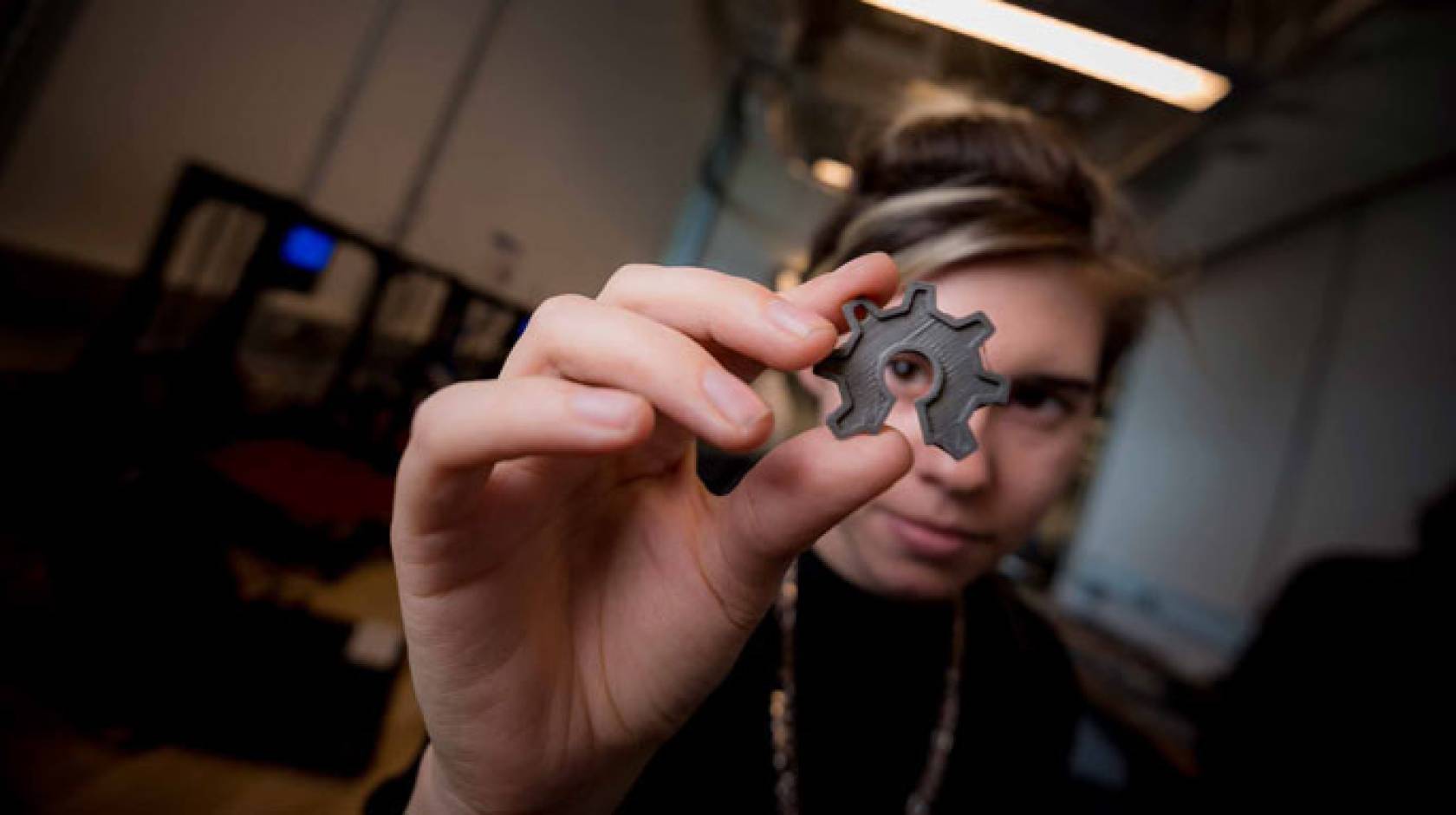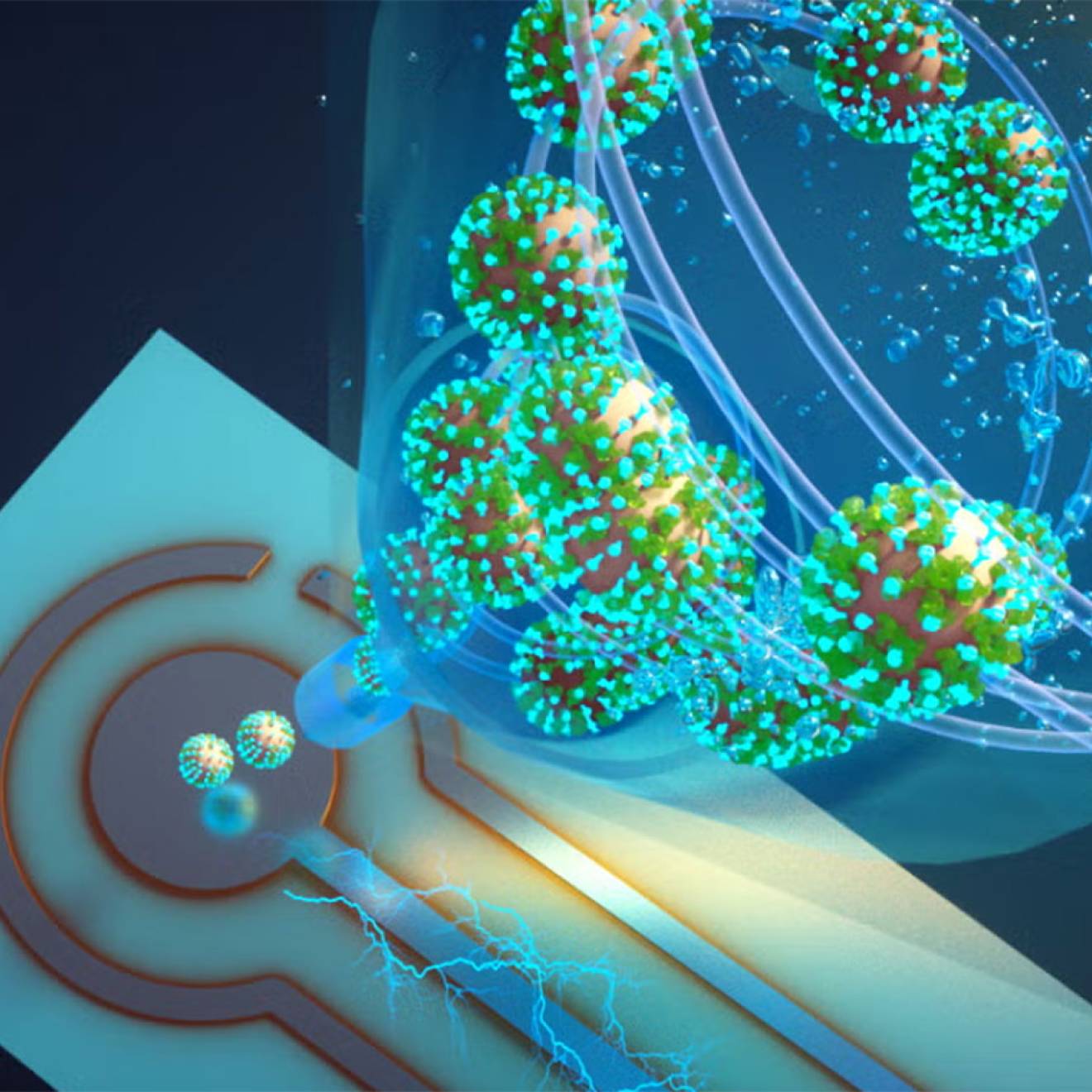Daniel Kane and Cynthia Dillon, UC San Diego

Engineers and visual artists are collaborating on final projects, even though they are in different classes.
This is just one of the many exciting things happening in the EnVision Arts and Engineering Maker Studio at UC San Diego. The new 3,000-square-foot studio on the third floor of the Structural and Materials Engineering building provides a wide range of design, fabrication and prototyping tools from 3D printers and welding stations to a sophisticated laser cutter. It’s a creative, hands-on, experiential space where visual arts and engineering communities converge; where students are empowered to think, design, make, tinker, break and build again.

Credit: Erik Jepsen/UC San Diego Publications
“UC San Diego is one of the few places where this kind of integration between visual arts and engineering cannot only happen, but can be sustained and expanded,” said UC San Diego Chancellor Pradeep K. Khosla at the EnVision dedication event Friday.
In its first quarter of operation, more than 400 students in engineering and visual arts worked in the maker studio through hands-on classes and labs as well as a few creative, independent projects.
“The spirit of collaboration and innovation, plus the skills that students gain through these unique courses are transferable to their careers well beyond their university years,” said Cristina Della Coletta, Dean of the UC San Diego Division of Arts and Humanities. “The cutting-edge curriculum aligns with our division's intellectual priorities and the intersection of perspective, skills, tools, creativity and rigorous interdisciplinary research supported by the university.”
“Our engineering and visual arts faculty are creating fantastic hands-on courses that take advantage of the maker studio’s powerful mix of design and prototyping facilities,” said Albert P. Pisano, Dean of the Jacobs School of Engineering. “We are giving students new opportunities to gain the confidence and motivation they will need to succeed in classes, internships, faculty research projects and, ultimately, their careers.”
Transforming education
The EnVision maker studio is a key component of the Jacobs School of Engineering’s Experience Engineering Initiative, a school-wide project that aims to give every engineering and computer science undergraduate student a hands-on or experiential engineering course or lab each year— starting freshman year. In recent Experience Engineering classes, students have built robots, 3D-printed knee cartilage, and designed fuel-cell-powered cars. Every project is tied to a concept or theory they will learn later in more advanced classes.

Credit: Farshid Bazmandegan
In the spring quarter, visual arts students interested in the new speculative design major will take classes in the new maker studio. Speculative design uses several different design technologies and methods, combining them in innovative ways. Visual arts graduate students in a working critique class will also be in the maker studio during the spring quarter.
A listing of recent and upcoming classes running in the maker studio can be found on the EnVision maker studio website.
A slam dunk
In the case of the artists and engineers with the same final project, students in Structural Engineering 1 and Visual Arts 40 worked shoulder-to-shoulder during the winter 2016 quarter. Together they created “whole objects” that merged sculptures with engineered support structures. Lelli Van Den Einde taught the structural engineering class while Brett Stalbaum taught the visual arts course.
“We had lectures, homework and labs, but this project was the slam dunk that I needed,” said structural engineering freshman William Jablonski. After struggling on the midterm, he found himself deeply engaged in his team’s interdisciplinary final project. The team had to figure out the conditions under which the sea dragon sculpture their visual arts teammate designed and 3D-printed would—and would not—damage or destroy the building the engineers designed and built.

Credit: Farshid Bazmandegan
“Going into the final, I had an understanding of what the theory actually means,” said Jablonski.
Visual arts student Jeszica McPeak is part of a team that created a physical representation of a collection of pixels. She liked working with her engineering team in part because interdisciplinary teams are everywhere in the professional world and in part because the collaboration allowed her to expand and realize her artistic vision.
“The maker studio is our saving grace,” said McPeak, referring to both the access to 3D printers and other building tools as well as technical expertise from her engineering team, the teaching assistants and EnVision staff director Jesse DeWald.
While the engineering students on the teams gave oral presentations and wrote lab reports, the visual arts students got real-world curation experience by preparing, launching and running an exhibit showcasing the sculptures. The exhibit’s final day is today. It is open to the public from 10 a.m. to 5 p.m. in galleries 201 and 202 on the second floor of the Structural and Materials Engineering building.
Unleashing creativity
The EnVision maker studio is not just for hands-on classes. It will be a space where student-organization teams and artists create; where student entrepreneurs build, prototype and innovate.

Credit: Erik Jepsen/UC San Diego Publications
Details on the tools in the maker space as well as information on scheduling time and upcoming workshops is on the EnVision website. The goal is to open the space to as many student groups and entrepreneurial students as possible, though first priority during the school year will go to the classes running in the maker studio.
Winter 2016 classes in the maker studio included the structural engineering and visual arts classes with the combined final project, a making, breaking and hacking electrical engineering class, an experience nanoengineering class and an introduction to bioengineering.
The EnVision maker studio is part of a campus wide strategy, borne out of the UC San Diego Strategic Plan, to integrate design with innovation and better support “making” on campus.
“Our work to strengthen design at UC San Diego and our investment in the maker studio are both part of a larger move to build and support the innovation capabilities of all our students, which includes giving freshmen opportunities to unleash their creativity,” said Chancellor Khosla.

